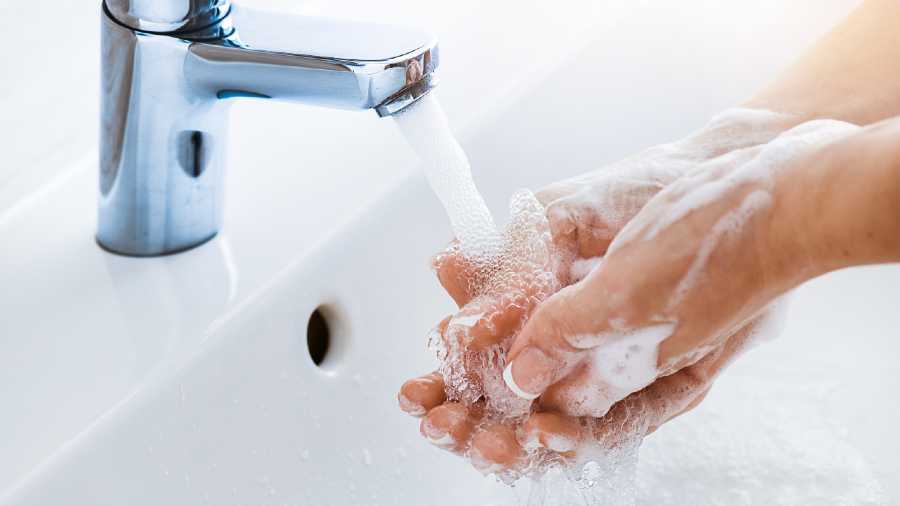After a year of obsessive 20-second hand-washings every time I touched something from outside my home, I think I should have stocked up on hand cream, not toilet paper, at the start of the pandemic. Nonetheless, I don’t regret this habit that, along with consistent mask-wearing and social distancing, helped me remain hale and hearty while waves of Covid-19 ravaged New York City. Not only did I stay free of the coronavirus, I never even got a sniffle despite daily outdoor exercise and dog walks and a stubborn refusal to let others do my grocery shopping.
Now, with many people seeming to have caught a cold in recent weeks as we get back into the world and drop our guard, it’s a good reminder that we shouldn’t drop the hand-washing habits we learned during the pandemic.
On average, our hands come into contact with hundreds of surfaces a day, exposing them to hundreds of thousands of microorganisms. Fortunately, most are innocuous. Still, given that we touch our faces about 16 or more times an hour, without proper hand hygiene, we risk the chance of introducing a not-so-harmless infectious organism, including the Delta variant of the coronavirus, into our mouths, noses or eyes.
Last year, the Centers for Disease Control and Prevention and just about every public health specialist emphasised repeatedly that hand-washing with soap and water for at least 20 seconds, or using an alcohol-based hand sanitiser when soap and water are unavailable, is the first line of defence against the spread of Covid-19.
The agency recommends using clean running water (warm or cold), plain soap (not antibacterial), lathering up, then rubbing hands together, front and back and between fingers. After the 20-second lather, rinse hands well to remove dirt and germs and minimise irritation. Then either air-dry for 20 seconds or use a clean towel; wet hands are vectors for transferring germs.
Before Covid and the resulting reminders at every turn of the importance of good hand hygiene, American hand-washing habits left much to be desired. Even health care workers have not always been diligent. A team from Britain and Australia reported in the Journal of Clinical Nursing last year that “as nurses, we are aware that hand-washing has not always been taken as seriously as it should, with compliance and adherence in clinical settings far from optimal over time.” According to multiple reports from different countries, before Covid, compliance with hand-hygiene guidelines among nurses averaged only 40 per cent, the team noted.
Washing one’s hands after using the bathroom is a universal recommendation, for good reasons. It’s been shown to reduce the incidence of diarrhoea by as much as 40 per cent. The coronavirus can be transferred through stool, and a single gram of human faeces can contain one trillion germs.
Surgeons, however, most likely win the hand-washing award these days. Surgical gloves did not exist when the 19th century surgeon Joseph Lister, whose name was co-opted by the product Listerine, demonstrated that preoperative disinfection was the key to preventing infections in surgical wounds. Hand-washing with soap and warm water, often with a brush, for five minutes became an accepted protocol at the end of the 1800s.
However, the introduction of sterile gloves did not render thorough hand cleansing by surgeons irrelevant. After surgery, some 18 per cent of gloves have been shown to have tiny punctures that are not noticed by surgeons more than 80 per cent of the time. And when an operation lasts two hours, more than a third of the surgeons’ gloves are likely to have holes.
Thus, anyone likely to touch the surgical field is supposed to scrub up to the elbows and under every fingernail for five minutes to reduce the risk of contamination. The goal is to eliminate microorganisms that inhabit the hands and inhibit the growth of bacteria under the surgeon’s gloves.
Surgeons are taught to use warm water, which enhances the effectiveness of soap. They’re told to avoid very hot water because it removes protective fatty acids from the skin, a good lesson for us all.
In an opinion essay in March on “The Neurology of Handwashing” in Medpage Today, Dr. James Santiago Grisolia of Scripps Mercy Hospital in San Diego described hand-washing as a kind of neurological sedative. “Washing the hands resonates deeply within our brain, sounding deep notes of acting with care and integrity in a dirty, sometimes dangerous world,” he wrote.
To minimise the tedium of watching the clock or counting to 20 every time you wash your hands, experts suggested singing the Happy Birthday song all the way through twice to achieve full ablution. However, Grisolia, citing a Covid-19 baby bust and the fact that in less than a year the pandemic spread throughout the world, suggested that a more timely mantra might be to sing the chorus to “It’s a Small World (After All).”
NYTNS










